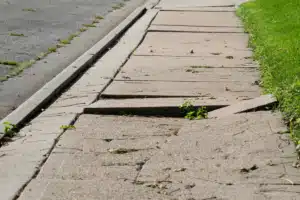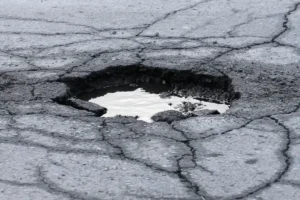Dangerous Condition of Public Property California
When you get injured because of a dangerous condition of public property in California, you may be eligible to file a claim against the responsible government agency. State law provides strict parameters for when a condition qualifies as dangerous. If you’ve been injured on public property, our experienced personal injury attorneys at Cutter Law can determine whether a government entity is liable and help you pursue significant financial compensation.
- Government entities have a legal duty to ensure your safety from hazardous conditions on public property.
- If the property owner is a state or local government entity and your injuries resulted from a dangerous condition on the property, you may be eligible to file a claim.
- You have six months to file a tort claim against a government entity.
What Is a Dangerous Condition of Public Property in California?
A dangerous property condition is defined by California Government Code 830 as one that poses a substantial risk of injury to a person using the property in a reasonably foreseeable manner. The law specifies that the risk of injury must truly be significant. If the risk is minor, it does not qualify as a dangerous condition.
Public property is that which is owned or controlled by a government entity. If privately owned personal property or easements are involved, that portion is not considered public property for liability purposes.
Examples of Dangerous Conditions of Public Property
Dangerous conditions of public property include a wide range of hazards, such as the following:
- Potholes on streets or highways
- Poorly maintained sidewalks with damaged pavement
- Dangerous playground equipment at public schools
- Untrimmed trees or bushes at a public park
- Poor lighting in public parking lots or driving areas
How to Prove Dangerous Conditions of Public Property
Getting hurt on government property does not in itself prove dangerous conditions existed. California Government Code 835 requires you to prove each of the following elements before holding a government entity liable for dangerous conditions of public property:
- A dangerous condition existed on the property when the injury occurred.
- The dangerous condition was the proximate cause of the injury.
- The injury was reasonably foreseeable, meaning the government entity should have known there was a risk an injury like yours could occur.
- A public employee created the dangerous condition through a negligent or wrongful act or omission.
- The government entity had actual or constructive notice of the hazard.
- The act or omission creating the hazard was unreasonable.
- The government agency failed to take reasonable measures to remediate the hazard.
Actual notice is the knowledge that the hazard existed and could cause an injury. Constructive notice means a dangerous condition was obvious or existed for such a long period that the government should reasonably have known the hazard was there and that there was a potential for injury.
Time Limit to File a Government Tort Claim
The California Tort Claims Act gives you six months to file a tort claim against a government entity. This is required before you can file a lawsuit. If the entity denies your tort claim, you have up to six months after the denial to file a lawsuit. If the public entity fails to respond, you have up to two years to file a lawsuit.
Governmental Immunities from Liability
Holding the government accountable for injuries is less straightforward than holding private property owners liable because state law gives government agencies immunity from liability in certain situations. A public agency cannot be sued when immunity applies.
The government may attempt to hide behind immunity without meeting all the conditions necessary for immunity to apply. Thus, hiring an attorney with experience handling government tort claims is crucial.
The government may claim immunity when the circumstances below apply, but only if certain conditions are met. Our personal injury lawyers at Cutter Law can determine whether immunity applies and help you fight public entities that attempt to duck liability under the guise of immunity.
Design Defect Immunity
Design defect immunity applies when a property condition is dangerous by design, but the state legislature or other governing body approved the design. If a property condition is out of conformity because government standards change, immunity continues to give the public agency reasonable time to update the property.
If the public entity cannot bring a property into conformity due to a lack of funding, immunity may still apply, but only if the agency provides adequate warnings about the hazards on the property.
Recreational Trails
Public entities that own walkways, sidewalks, paved roads, unpaved roads, easements, or other pathways that lead to recreational activities such as hunting, fishing, biking, or watersports are immune from lawsuits for injuries that occur in these areas. Public entities are only required to provide warnings about hazards on paved pathways.
Weather Conditions
Public entities are immune from liability for harm on roadways caused by weather conditions, including fog, wind, rain, flood, ice, and snow.
However, public agencies may be held liable for injuries if the effects of such weather events would not be obvious to a reasonable person. Immunity also does not apply if injuries result from physical damage or deterioration of the roadways stemming from weather conditions.
Unimproved Property
Public entities in California are immune from lawsuits for injuries on undeveloped, publicly owned land. This includes lakes, streams, and beaches. However, immunity only applies to natural land features. Public entities can be held liable for injuries caused by manmade features added to the land.
Road Maintenance
A government agency is immune from injuries caused by road construction, maintenance, grading, or repair when the road is not officially accepted as part of the road system. This immunity only applies if the agency ensures the construction is performed with reasonable care and the road is not left more unsafe than before the work was performed.
Hazardous Activities
Public entities are immune from liability for injuries that stem from hazardous activities, such as the following:
- Swimming without lifeguards present
- Diving into water outside of designated areas
- Animal riding
- Bicycle racing
- Downhill skiing
- Hang gliding
- Kayaking
- Off-road motorcycling or driving
- Rock climbing
- Surfing
- White water rafting
Dog Parks
Government entities are immune from liability for injuries caused by dogs’ actions in dog parks.
How Cutter Law Can Help Injured Victims of Dangerous Conditions of Public Property
We have decades of experience helping individuals stand up to powerful public entities, and we have won hundreds of millions in settlements and verdicts. We are unafraid to take on the most challenging cases. Many of the cases we won were for clients turned away by other law firms who thought their cases were too challenging or expensive.
When you hire our devoted and compassionate attorneys, we will handle all of the red tape for you so you can focus on getting better. You can count on us to take care of the following for you in a claim against the government:
- Investigate the site and gather evidence to prove the public entity’s liability
- Fight claims of immunity by the public entity
- File your claim before the deadline expires
- File your lawsuit if the government denies your claim or fails to respond
- Stand with you for as long as it takes to win the compensation you deserve
- Negotiate for a fair settlement or fight for you in court
Even if you have been told that the government has immunity in your case, don’t let that stop you from contacting our talented personal injury lawyers. We work as a team to get you the best results, and we have overcome even the toughest claims of immunity by government entities that didn’t want to pay. Contact us today to schedule a free consultation.

The California Tort Claims Act allows individuals to sue the state government in limited circumstances, such as premises liability cases.

Yes, you can sue the city if the sidewalk was poorly maintained and caused your injury, provided you can prove negligence on their part.

Yes, you can sue a government entity for poor road conditions if they fail to maintain the road safely, leading to an accident and injury, but you must meet strict deadlines and prove negligence.
